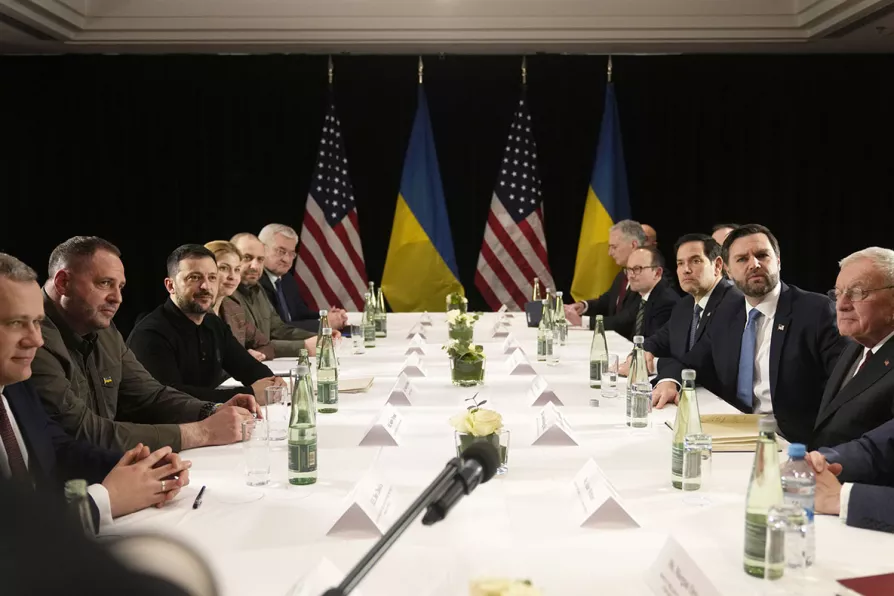
 United States Vice-President JD Vance (second right) and United States Secretary of State Marco Rubio (third right) meet with Ukraine's President Volodymyr Zelenskyy (third left) during a bilateral meeting on the sidelines of the Munich Security Conference in Munich, Germany, February 14, 2025
United States Vice-President JD Vance (second right) and United States Secretary of State Marco Rubio (third right) meet with Ukraine's President Volodymyr Zelenskyy (third left) during a bilateral meeting on the sidelines of the Munich Security Conference in Munich, Germany, February 14, 2025
THE geopolitics of Europe are moving. The least we should demand of our elected representatives in Parliament is a frank discussion of that.
We have been denied one. When Russia launched its illegal invasion of Ukraine in February 2022, Labour MPs who signed a Stop the War Coalition statement condemning that invasion, but pointing to the role Nato expansion to Russia’s borders had played in provoking it, were ordered to remove their names or lose the Labour whip.
Keir Starmer is the most intolerant Labour leader in the party’s history: authoritarian crackdowns on any member or MP who dares to differ with him are no novelty. But given the incalculable stakes when it comes to brinkmanship with nuclear-armed states, we should see refusal to countenance discussion on war and peace as especially dangerous.
In contrast to controversies of the past — from Suez to Iraq — there has been almost no debate in Parliament or Establishment media about the Ukraine war or the wisdom or otherwise of our government’s approach to it.
Not only did Starmer silence by diktat, immediately, those MPs who pointed out (alongside die-hard US imperialists like Henry Kissinger) that Nato policy over the past decade had been widely predicted to provoke a violent Russian reaction.
The ruling-class consensus suffocated the media: in the first week of the war, BBC Question Time presenter Fiona Bruce shut down an audience member who asked the panel whether Nato expansion might have provoked the invasion, and panel members were not permitted to answer. It should be possible to disagree on the causes of the Ukraine war without endorsing such censorship.
By making disagreement treasonous, governments have been given carte blanche to escalate the war without having to persuade the public of their case.
When — because the Joe Biden administration gave permission, since the White House always held a veto over our foreign policy that is denied to British opinion — the Labour government gave the green light to Ukraine firing missiles at targets inside Russian territory, it was not even announced in Parliament, nor raised until independent MP Jeremy Corbyn did so. Yet the risks of retaliation are obvious. Parliament failed to hold government to account by making ministers explain themselves.
This silence on alternative foreign policy has never applied in the United States. Its ruling class don’t hesitate to assess and reassess their strategic approach.
Washington never cared about Ukraine, as Britain’s peace movement warned from the start.
The war lobby have not only prolonged the agony. Those who cried treachery at calls for dialogue should face the reality: if Boris Johnson had not scuppered the April 2022 peace deal on offer in Istanbul, Ukraine would be far better off now.
Hundreds of thousands of dead people would still be alive. And Russia had not at that stage made expansionist territorial claims on the scale it has done since, claims the US is now happy to accept as part of a great power carve-up.
Europe is left high and dry. Starmer’s response is to see how far we can pursue US policy without the US: hence the proposal to deploy British troops to Ukraine, though the huge military build-up by Western powers on Russia’s borders was a cause of the war, not a deterrent.
Even Starmer states openly that no such plan will work without backing from the United States, which has said it will not offer support to a European deployment in Ukraine nor come to its aid if it is attacked.
Starmer is putting Britain at risk of conflict with a nuclear power, and true to form, made his offer to foreign governments without the courtesy of a nod to Parliament.
Lives should not be risked so carelessly, and British belligerence has done nothing but harm to date.

In an address to the Communist Party’s executive at the weekend international secretary KEVAN NELSON explained why the communists’ watchwords must be Jobs not Bombs and Welfare not Warfare

As Britain marks 80 years since defeating fascism, it finds itself in a proxy war against Russia over Ukraine — DANIEL POWELL examines Churchill’s secret plan to attack our Soviet allies in 1945 and traces how Nato expansion, a Western-backed coup and neo-nazi activism contributed to todays' devastating conflict












